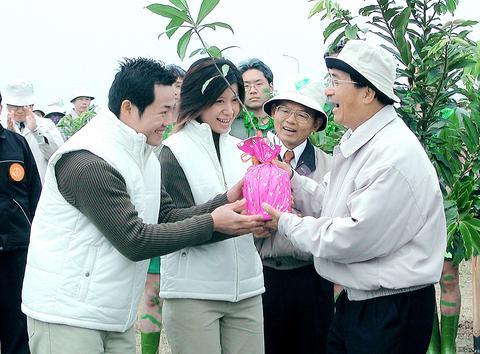President Chen Shui-bian (
In a speech at a ceremony to introduce the Arbor Month campaign, Chen said his administration's infrastructure construction and reform programs in various fields are like "planting saplings to sustain Taiwan's development."
"We hope construction and reform will continue and bring prosperity and good fortune to our people, just as saplings grow strong and blossom," Chen said.

PHOTO: CNA
Noting that trees can symbolize the continuity of hope and the spirit of perseverance, Chen said his administration has spared no effort to boost afforestation and ecological conservation.
"We have been determined to raise the amount of land in Taiwan covered by forest to 60 percent of the island's total land area by 2008," Chen said.
To realize the goal, Chen said, the government last year designated the period from Feb. 4 to March 12 as Taiwan's Arbor Month. This year's campaign plans to establish more than 1.3 million plants and seedlings on some 600 hectares of community parkland and school campuses around the nation.
Many senior officials, including Presidential Office Deputy Secretary-General Chen Che-nan (
They planted saplings at the Hsinta Fishing Port, which has been transformed from a sleepy deep-sea fishing base into one of the largest recreational fishing ports in Southeast Asia. The tree-planting activity also attracted thousands of residents of southern Taiwan to participate.
Tai said that the Council of Agriculture and the nation's eight forest administration bureaus will jointly organize 27 large-scale tree-planting activities in various parts of the island over the course of Arbor Month.
The government designated the day of national founding father Dr Sun Yat-sen's passing as Arbor Day four years after his death in 1925. Today, trees are planted each March 12 in remembrance of Sun's encouragement of afforestation and his contribution to the nation.

Alain Robert, known as the "French Spider-Man," praised Alex Honnold as exceptionally well-prepared after the US climber completed a free solo ascent of Taipei 101 yesterday. Robert said Honnold's ascent of the 508m-tall skyscraper in just more than one-and-a-half hours without using safety ropes or equipment was a remarkable achievement. "This is my life," he said in an interview conducted in French, adding that he liked the feeling of being "on the edge of danger." The 63-year-old Frenchman climbed Taipei 101 using ropes in December 2004, taking about four hours to reach the top. On a one-to-10 scale of difficulty, Robert said Taipei 101

A preclearance service to facilitate entry for people traveling to select airports in Japan would be available from Thursday next week to Feb. 25 at Taiwan Taoyuan International Airport, Taoyuan International Airport Corp (TIAC) said on Tuesday. The service was first made available to Taiwanese travelers throughout the winter vacation of 2024 and during the Lunar New Year holiday. In addition to flights to the Japanese cities of Hakodate, Asahikawa, Akita, Sendai, Niigata, Okayama, Takamatsu, Kumamoto and Kagoshima, the service would be available to travelers to Kobe and Oita. The service can be accessed by passengers of 15 flight routes operated by

Taiwanese and US defense groups are collaborating to introduce deployable, semi-autonomous manufacturing systems for drones and components in a boost to the nation’s supply chain resilience. Taiwan’s G-Tech Optroelectronics Corp subsidiary GTOC and the US’ Aerkomm Inc on Friday announced an agreement with fellow US-based Firestorm Lab to adopt the latter’s xCell, a technology featuring 3D printers fitted in 6.1m container units. The systems enable aerial platforms and parts to be produced in high volumes from dispersed nodes capable of rapid redeployment, to minimize the risk of enemy strikes and to meet field requirements, they said. Firestorm chief technology officer Ian Muceus said

MORE FALL: An investigation into one of Xi’s key cronies, part of a broader ‘anti-corruption’ drive, indicates that he might have a deep distrust in the military, an expert said China’s latest military purge underscores systemic risks in its shift from collective leadership to sole rule under Chinese President Xi Jinping (習近平), and could disrupt its chain of command and military capabilities, a national security official said yesterday. If decisionmaking within the Chinese Communist Party has become “irrational” under one-man rule, the Taiwan Strait and the regional situation must be approached with extreme caution, given unforeseen risks, they added. The anonymous official made the remarks as China’s Central Military Commission Vice Chairman Zhang Youxia (張又俠) and Joint Staff Department Chief of Staff Liu Zhenli (劉振立) were reportedly being investigated for suspected “serious